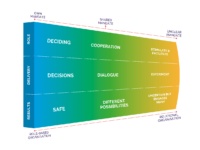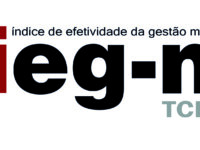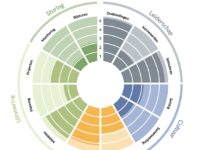The TAP portal is a unique e-government system at the European Union level, which ensures the development of digital government legislation, moving from documents to structured data. The TAP portal ensures the proceedings of the meetings of the Cabinet of Ministers and allows every citizen of Latvia to follow the progress of the Government's decision-making and express an opinion on the regulatory acts being developed by the Government.
Innovation Tag: Systems Change
Case Study
Innovation Zones, Facets and Beyond – LIEPT (Lund Innovation Ecosystem Portfolio Tracking)…

To provide a systematic approach for initiating and tracking collaborative development processes over time and inform investment decisions in multi-stakeholder environments, Future by Lund (FBL) has implemented a new model for innovation ecosystem portfolio tracking (LIEPT). The model benefits partnering stakeholders by building strategic competence for scaling solutions and working with innovation portfolios as an approach for governing and developing the ecosystem’s priority areas.
The AJSC has developed a new model to measure the determinants of the ‘quality of life’ in Ajman, covering six key areas of public service. The Model comprises a comprehensive factor measurement framework embedded on a sophisticated web-based application, with inbuilt protocols for scientific data collection, project management, data visualization and reporting. It systematically measures gaps and impact of interventions, via targeted performance assessment of framework factors.
The reason for creation was to improve inspection models of external control, which were based mainly on legality and conformity. IEG-M index is an instrument for measuring public area effectiveness, as it analyses the inputs, resources and processes of the local administration, evaluating its policies and activities. There are many finalistic results indexes, but none of them deals with the evaluation of processes to analyse the application of public money that impacts local communities.
AFSA regulates the bankruptcy system in Australia. The system is designed to support those in vulnerable situations due to circumstances beyond their control. However, there are bad actors who exploit the system by hiding assets/income. Using our risk-based regulatory approach, we have designed a system that uses an applicant's data and validates it against external data sets to detect potential misconduct. We aspire to build a data model to predict non-compliance at the system entry point.
Over 3 million citizens annually visited government offices in Delhi for various transport services. To reduce interference of middleman, application pendency and physical exposure in view of ongoing Covid-19 pandemic, faceless services have been launched to offer transport services to citizens at the comfort of their home. Using AI, e-sign, biometric-based authentication and institutional restructuring, faceless services provide hassle-free contactless services to citizens.
Seocho-gu is the first district in Korea to offer a service like the “Seocho BookPayback Service” (hereafter, “BookPayback”), which reduces the waiting time for popular library books. A full refund is provided for a book purchased from a local bookstore that is returned (to the bookstore) within three weeks, after which the book is sent to a library in Seocho-gu. It is an innovative library service that allows residents to use library resources whenever needed, regardless of time or…
Case Study
Tertius – An online construction marketplace that easily connects property developers with…
Tertius has resulted in massive productivity gains for the building industry in DC, enabling developers & property owners to book (at a nominal cost) certified third party agency inspections. Outcome: Far more efficient matching of demand & supply for permit inspections, substantially reducing turnaround times. Tertius has driven revenue to the taxpayers, increased regulatory oversight, increased safety in the building community, saving property owners and developers thousands of dollars.
Officina is a lab for innovation in the public sector whose main objective is to catalyse the energy of young talents by offering them a transformative training programme. Officina was developed to address a triple urgency: future decision makers not perceiving the public sector as an attractive workplace; the public sector having high average age workforce and lack of innovative approaches; society at large needing a more modern and appealing public sector in this key historical moment.
A lot of innovative activities are carried out by Dutch and other governments. Unfortunately, the impact is limited. Innovations are stand alone projects, not implemented or scalable within primary processes. This reference model supports the implementation of an innovation management system for governments. The starting point is an Innovation Maturity Scan. Tooling, training and handouts are available supporting a social and process innovation transition at governmental organizations.




